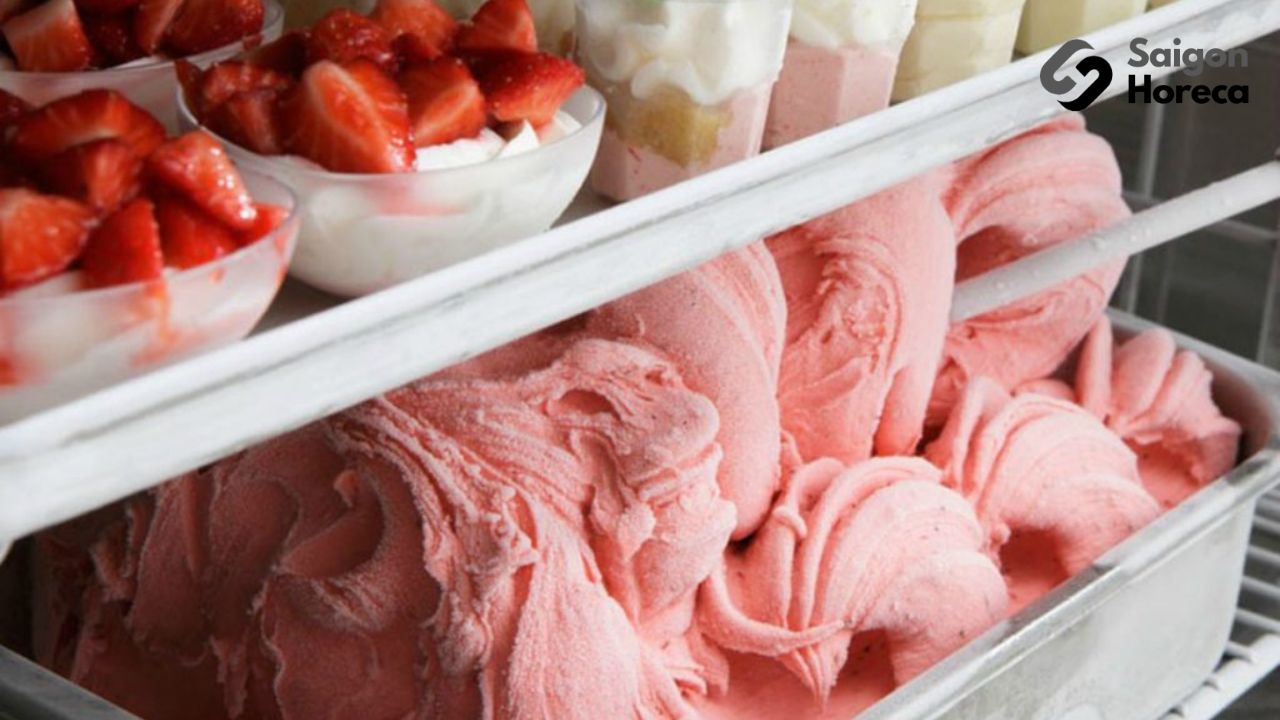Is there a safer and more hygienic way to chill...
Read More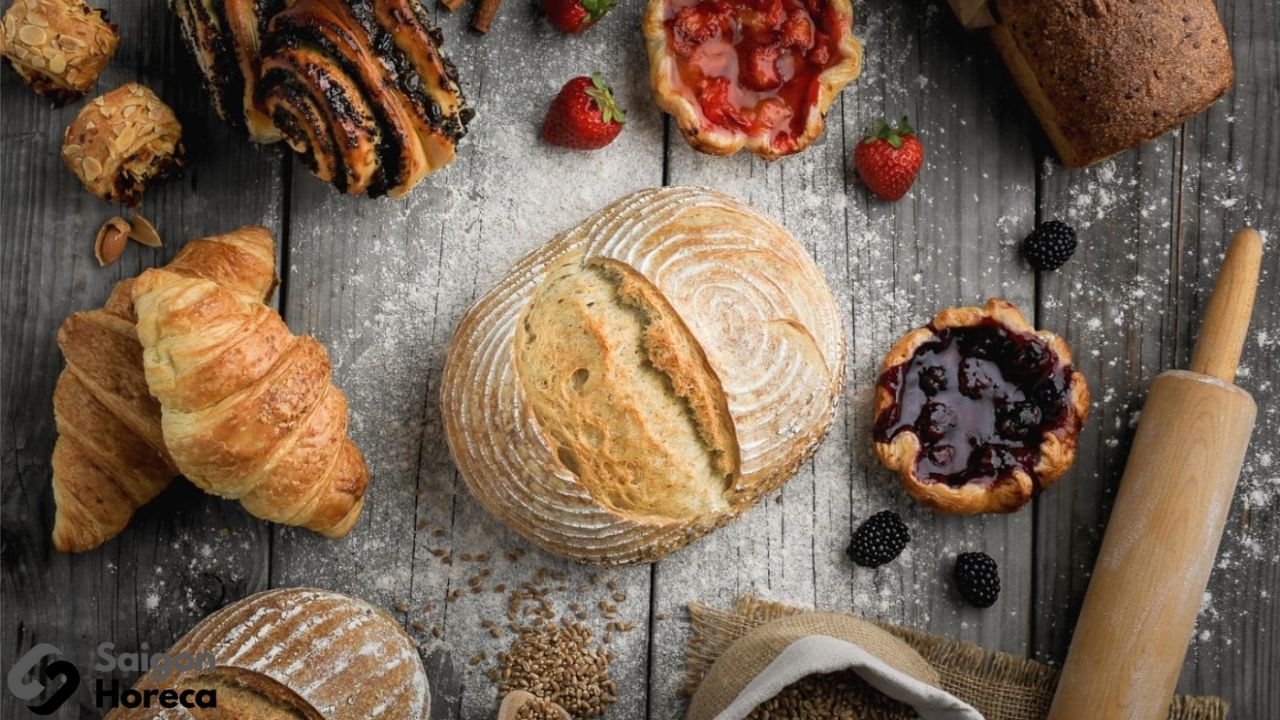

- News
9 Essential Steps for Opening a Bakery: A Detailed Guide for a Successful Business
- November 23, 2023
Have you ever dreamt of owning a charming little bakery, where exquisite and delightful pastries are crafted by your talented hands? Opening a bakery is not just a business plan but also an exciting and challenging journey. To turn this dream into reality, careful preparation and adherence to specific steps are crucial.
In this article, we will explore the detailed steps to successfully open a bakery, especially in the highly competitive market of today. We’ll provide valuable insights into planning, managing, and promoting your bakery to attract customers and maintain prominence in the industry. Let Saigon Horeca guide you through the essential steps, from conceptualization to realization, so you can capture not only customers’ taste buds but also their hearts.
In this article
Explore the Diversity of Bakeries Today
Wholesale Bakeries:
Wholesale bakeries serve as the “supply hub” for the pastry industry. They specialize in providing pastries and baking ingredients to other businesses such as restaurants, hotels, large bakeries, and food production facilities.
- Characteristics:
Wholesale bakeries, in the pastry industry, are not just places for mass-producing pastries; they are reliable supply partners for various businesses like convenience stores, restaurants, and coffee shops. Instead of focusing on selling directly to end consumers, wholesale bakeries concentrate on meeting the needs of wholesale customers, requiring them to have a large-scale operation to ensure a stable supply.
One unique feature of wholesale bakeries is the large scale of their production activities. To meet the demands of wholesale customers, they need to maintain efficient and modern production processes, often investing in spacious facilities and professional equipment. While not directly serving end customers, the quality and variety of products are crucial factors determining satisfaction and reliability for wholesale clients.
Unlike retail bakeries, wholesale bakeries do not require a front-of-house (FOH) area and do not need to be located in prime or crowded locations. Instead, they focus on optimizing production and storage space, helping them save costs and concentrate on maintaining an efficient production process to meet the large demands of wholesale customers.
With a high initial investment and professionalism in production, wholesale bakeries are not just places that create pastries; they are reliable supply partners, providing stability and diversity in the pastry industry today.
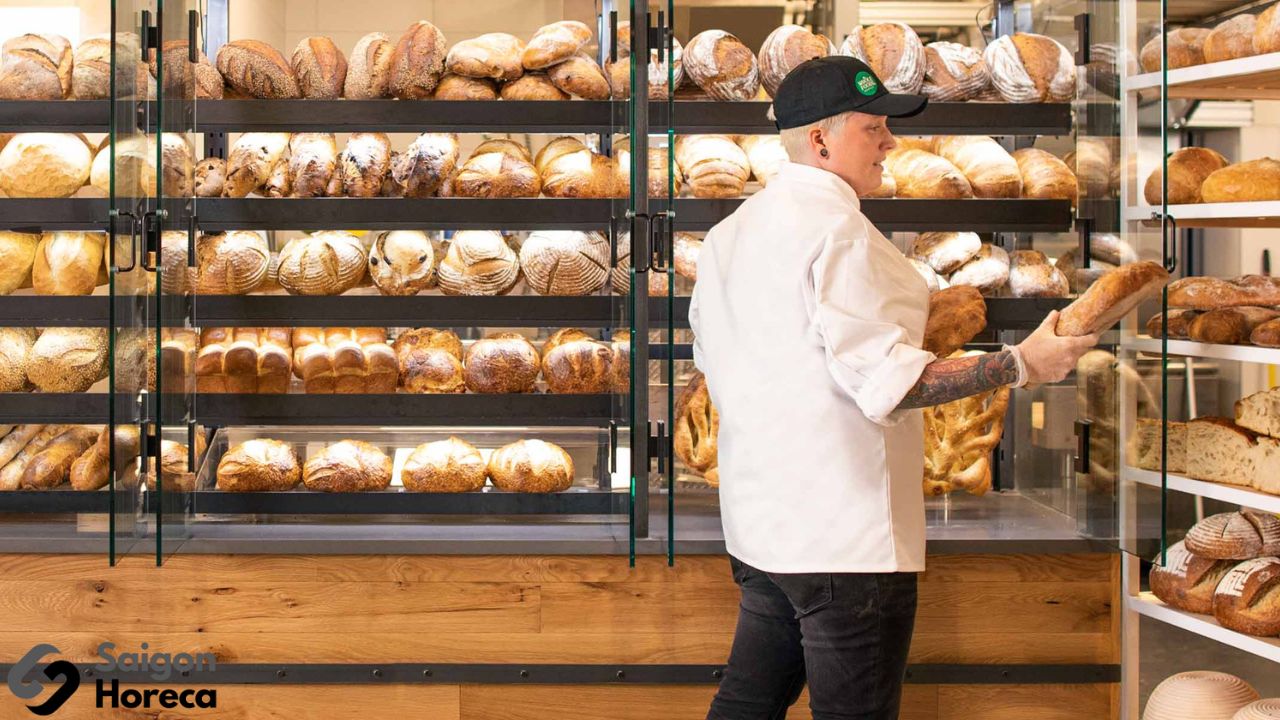

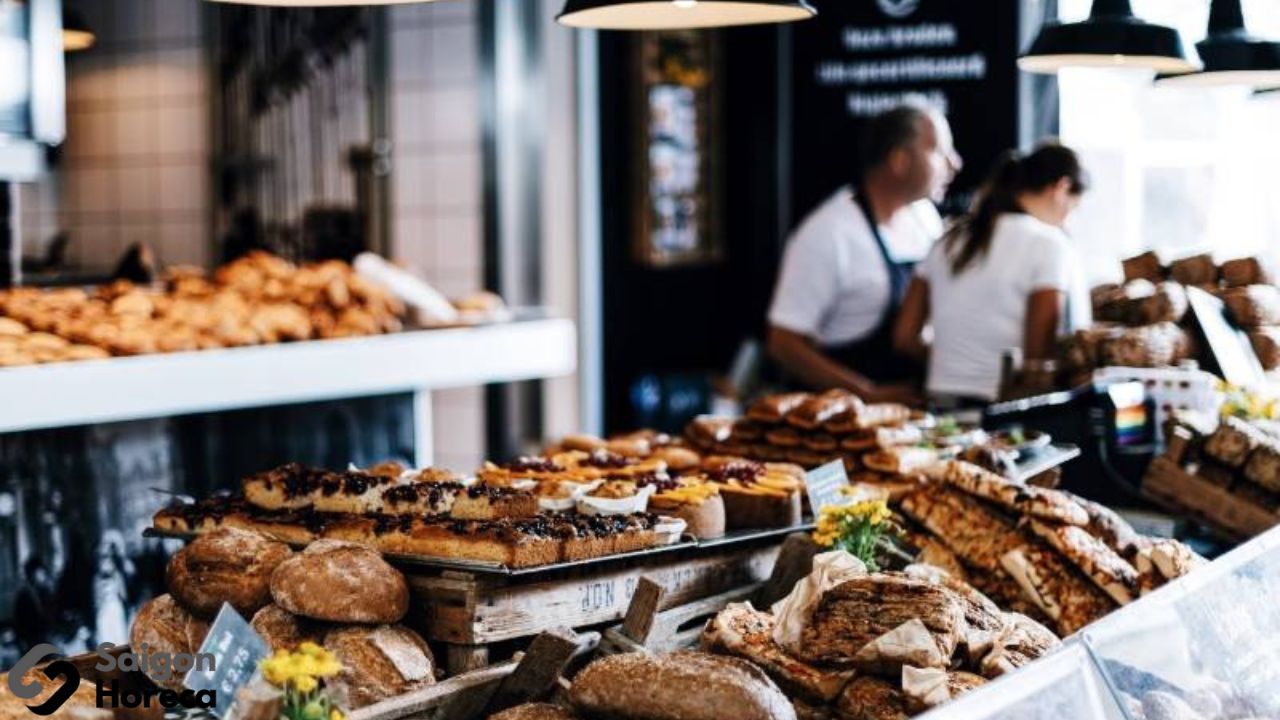

Retail Bakeries
Retail bakeries focus directly on serving end consumers. They are often placed in convenient locations to attract customers and create compact and appealing products.
- Characteristics:
- Personalized shopping experience and direct communication with customers.
- Emphasis on innovation in design and preparation to attract attention.
- Providing a variety of products to meet the needs and preferences of the target audience.
Retail bakeries are one of the most common types in the pastry industry, mainly focusing on selling directly to end customers. These establishments can be divided into various subtypes, specializing in specific types of pastries, offering diversity and choices for consumers. One notable aspect is that retail bakeries need both a front-of-house (FOH) and back-of-house (BOH) area to create a comprehensive shopping experience.
Here are some basic types of retail bakeries:
- Bakery-Café:
Combining a bakery with a café, these establishments mainly offer light snacks such as sandwiches, pastries, cookies, along with various types of tea and coffee. Bakery-cafés typically have seating areas to provide an inviting and cozy atmosphere.
- Counter Service:
With limited front-of-house space, these bakeries utilize a counter for customers to quickly purchase pastries and take them away. Convenience is the key in this model.
- Mobile Bakery Trucks:
Using mobile trucks to sell pastries provides flexibility and access to diverse customers. Although space is limited, mobile bakery trucks often offer unique and attractive pastries.
- Specialty Bakeries:
Specializing in a particular type of pastry, such as wedding cakes, cupcakes, or desserts for those with dietary restrictions. The focus on specialization helps these bakeries stand out with unique and high-quality products.
- Home Bakeries:
Becoming increasingly popular, home bakeries often advertise and sell products online, providing convenience for customers and reducing operational costs.
Each type of retail bakery offers a unique experience, from the warm atmosphere of bakery-cafés to the convenience of counter service and the uniqueness of mobile bakery trucks. Exploring this diversity provides customers with more choices and creates opportunities for innovation and development in the pastry business.
9 Steps to Prepare for Opening a Bakery: A Detailed Guide for a Successful Business
Opening a Bakery: Smart Starting Point – Business Plan
The most crucial step in preparing to open a food establishment is creating a detailed and strategic business plan. This plan is not just the first step but the foundation for success in the food service industry. To ensure effectiveness and transparency, a business plan typically includes seven key sections:
- Project Overview:
- Preliminary Introduction and Company Description:
- Market Research:
- Products and Services:
- Management Plan and Ownership Structure:
- Marketing and Advertising Strategy:
- Financial Projections:
A business plan not only helps attract attention from investors but also serves as a roadmap for the business process. It is a crucial tool to define goals, guide strategic decisions, and ensure transparency in all aspects of the project. A well-crafted business plan is not only the key to securing funding but also a fundamental step in successfully navigating the next stages of a culinary business.
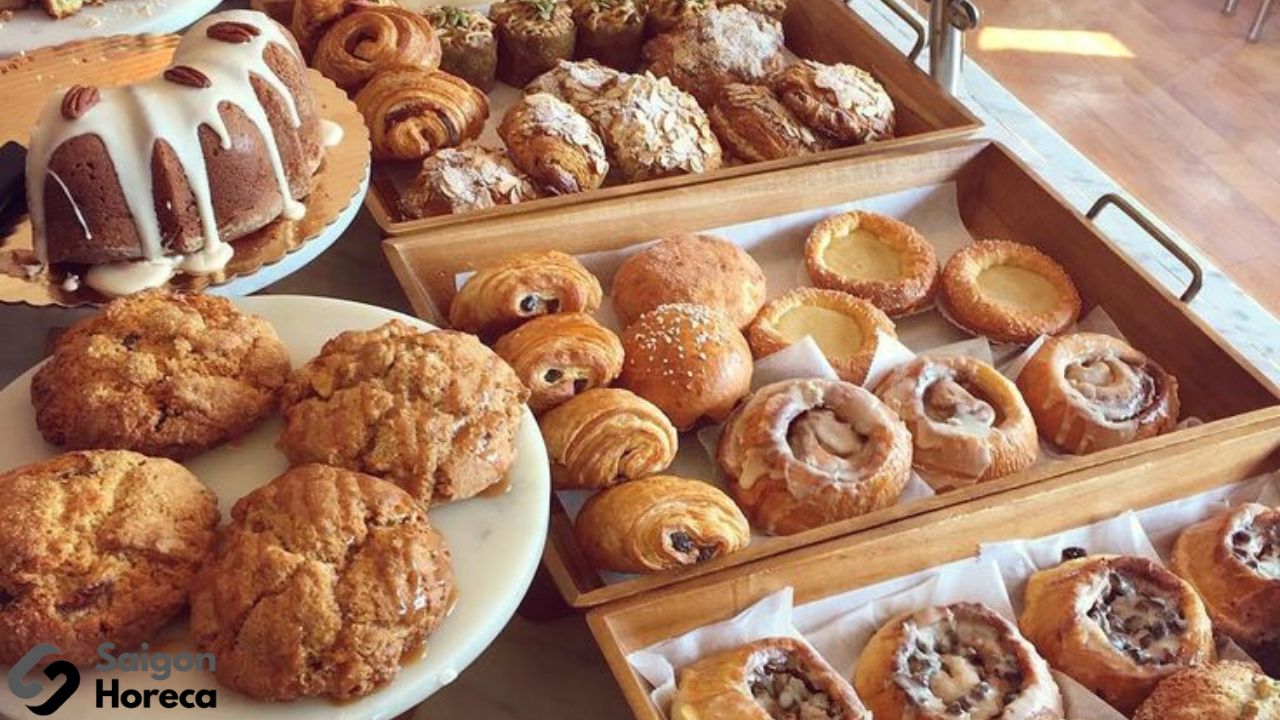

Financial Resources for a Strong Start – Financing Plan
When embarking on the journey of opening a bakery, managing and covering the initial investment costs is a crucial aspect that cannot be overlooked. This includes expenses such as leasing business space, purchasing insurance, acquiring equipment and supplies, hiring and training staff, as well as utilities. Faced with these significant costs, preparing a sufficiently robust financial plan is of utmost importance.
In cases where owners and shareholders cannot cover all these expenses with personal capital, considering startup financing methods becomes a vital next step. There are three main methods that many businesses contemplate:
- Traditional Commercial Loans:
- This method involves borrowing capital from any central or local bank. While it offers low-interest rates and provides a substantial amount of capital, it often requires a high credit score and typically involves a waiting period.
- Credit Lines:
- Similar to using credit cards, this method allows you to have a line of credit. The spending limit is reduced as you use it and has the potential to extend as you make payments. However, credit lines have limitations and require adherence to more standards than other methods.
- Small Business Loans:
- Organized by the Small Business Association, this type of loan provides startup capital while minimizing risk. While featuring low-interest rates and being suitable for individuals with limited credit, the application process and approval time can be longer compared to other methods.
Remember that managing finances intelligently and implementing a reasonable financing strategy will help your bakery overcome the initial challenging phase and lay the foundation for sustainable growth in the future.
Leasing Business Space
After ensuring you have sufficient capital, the next step is to seek suitable business space. The choice of space depends on the specific type of bakery you intend to open. For example, if you decide to operate a mobile bakery, you’ll need a truck and a contract to use a kitchen that specializes in supplying baked goods. Conversely, retail bakeries will look for space near potential customers and with a suitable area for the storefront.
For wholesale bakeries that primarily supply to other businesses, the location may be in the outskirts and not necessarily close to city centers. Critical factors to consider during the selection of business space include:
- Community Population in the Area: Evaluate the liveliness and consumer demand of the community in the surrounding area.
- Commerce Activity Level: Determine the level of commercial activity in the area, especially the presence of competing businesses.
- Proximity to Ingredient Suppliers: Ensure convenient access to ingredients for baking.
- Competitiveness: Research the competition in the area and determine how you can stand out and attract customers.
- Space Size and Condition: Examine the available space and its current condition to ensure it aligns with your business plans.
- Zoning and Health Regulations: Comply with zoning regulations and health standards specific to the region.
- Security and Crime Concerns: Assess the level of security and crime concerns in the area to protect both the business and customers.
After identifying a suitable location, negotiating and signing a lease agreement is a crucial next step. During this process, having the support of a lawyer can help you ask the right questions, negotiate favorable terms, and avoid unforeseen issues in the future. Clearly defining terms related to land area, repair cost responsibilities, and included utilities is essential to ensure a smooth and trouble-free leasing relationship.
Steps to Obtain Licenses and Permits Efficiently
In the food business sector, robust compliance with federal, state, and local regulations is vital. To open a bakery, you need to integrate these legal elements by ensuring you obtain essential licenses and permits before commencing operations.
Monitoring and adhering to local laws and regulations are crucial steps in determining the specific licenses you need to register for. This not only ensures legal compliance but also helps build trust and credibility with customers. Here are some critical aspects to consider:
- Business License: Identify the type of business license necessary for your bakery. These may include food licenses, retail licenses, and other documents depending on your business’s specific location.
- Food Safety: Ensure compliance with federal and local food safety standards. Food production facilities often undergo safety checks and must adhere to hygiene regulations.
- Health and Safety: Check and ensure that all health and safety elements within your bakery comply with the regulations of health departments and safety authorities.
- Food and Beverage Approval: For businesses providing food and beverages, make sure you have registered and adhere to regulations related to food and beverage acceptance from managing authorities.
- Promotion and Advertising: Understand regulations related to promoting and advertising food, especially for products containing specific ingredients or allergens.
By clearly identifying and fulfilling legal requirements, you not only ensure the legal integrity of your business but also build customer trust, increasing the chances of success in the food industry.
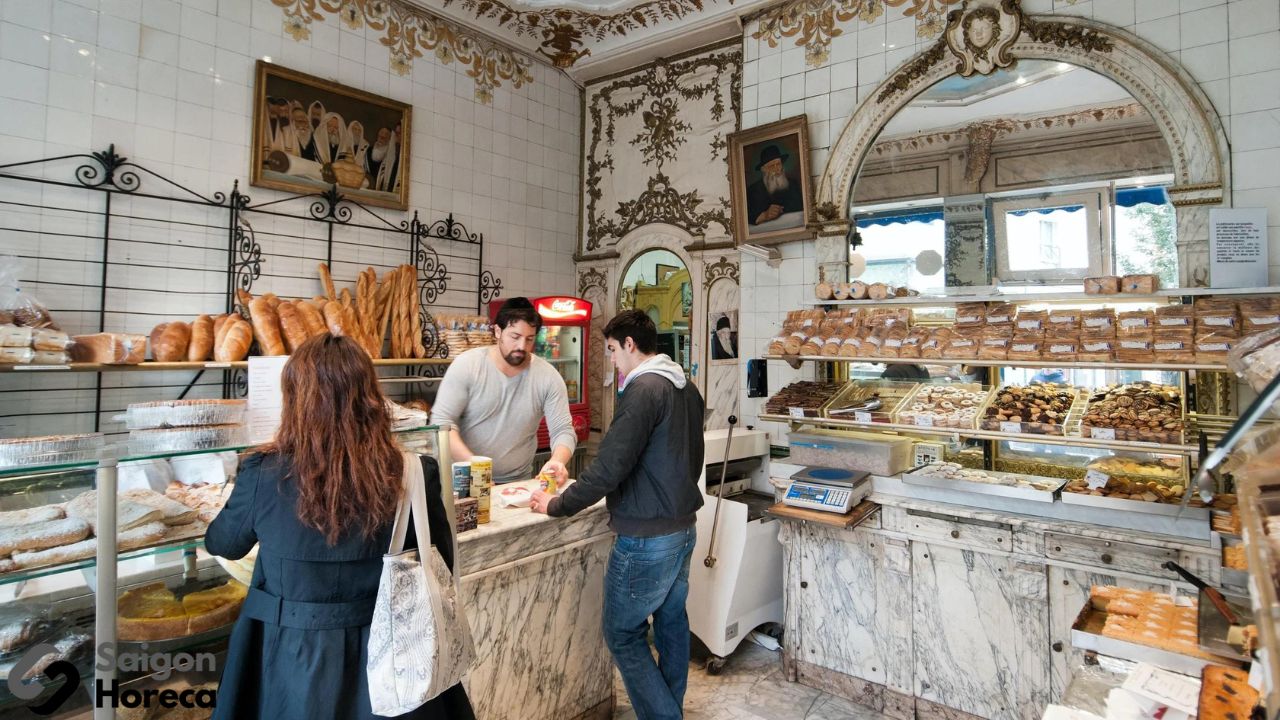

Overview Diagram: Effective Design Plan for Back-of-House (BOH) and Front-of-House (FOH)
After selecting the bakery location, you begin planning the type of equipment needed and how to organize the kitchen. Additionally, if your bakery includes a front-of-house area, you need to design this section as well.
Back-of-House (BOH) Design
There are several ways to organize the kitchen and equipment, but it is generally divided into four areas: the dishwashing area, storage area, preparation area, and the main kitchen area. For bakeries with a café section, there might be a front-of-house area with a counter serving food directly to customers.
Typically, you layout the kitchen based on the flow of food. Start with the food storage area, then move to the preparation and baking area. Finally, there’s the customer service or packaging area. All dirty dishes, pots, and pans should be centralized in one location for easy cleaning.
The layout of the kitchen depends on the rental space, water sources, and gas lines. Before finalizing the design, measure again to ensure enough space for necessary equipment and tools.
Front-of-House (FOH) Design
Some bakeries will have a front-of-house area where customers can choose and purchase baked goods. Creating a suitable front-of-house space contributes to making customers feel comfortable and facilitates quicker decision-making. There are four types of layouts, each with its own advantages:
- Flat layout: The display counter is arranged in a straight line for easy customer selection.
- Corner layout: This layout uses curved shelves to create a premium presentation.
- Diagonal layout: This layout allows customers to move easily around the bakery.
- Combined layout: You can combine all types to utilize available space effectively.
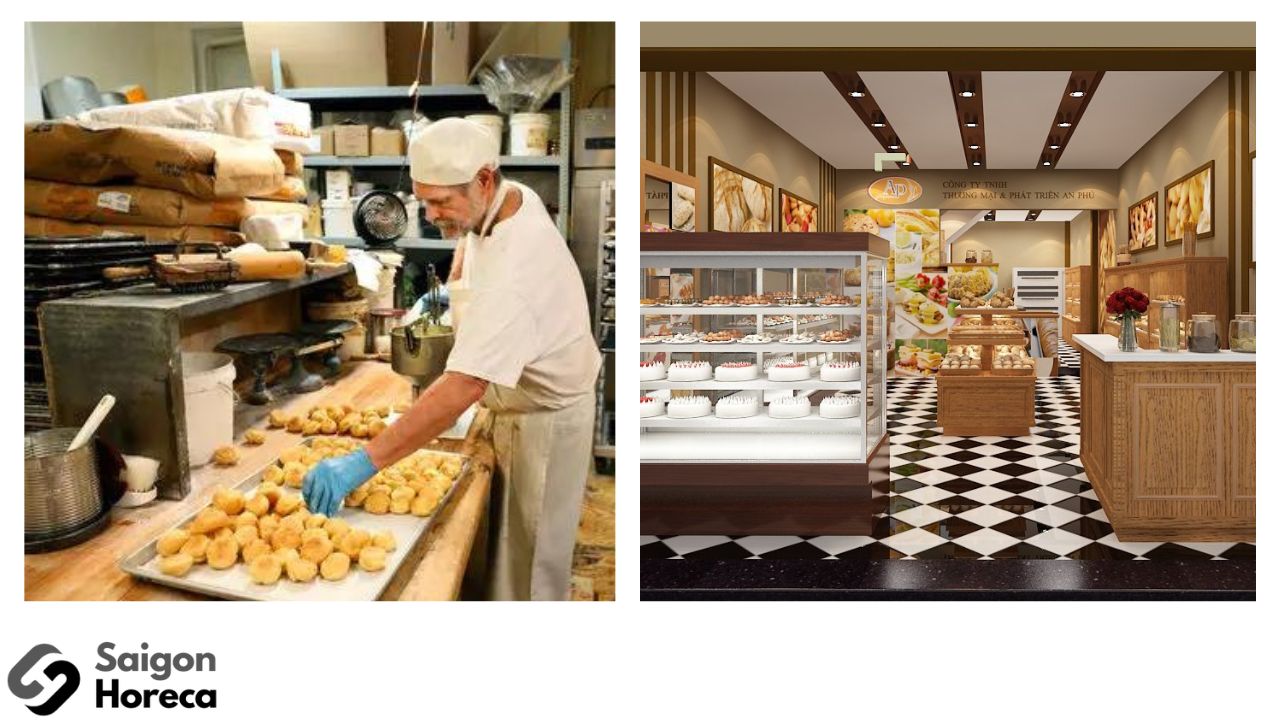

Shopping for Tools and Equipment
The tools and equipment a bakery needs depend on the type of baked goods you plan to sell. For example, if you’re focusing on cakes with ganache and frosting, you may need specific tools for that, while a bakery focusing on fresh bread may not require those tools. Depending on the size and type of bakery, you may need various equipment; here are some basic tools:
Dough Preparation Tools:
These include standard dough mixers, shaping tables, dough dividers, dough rollers, and dough scales. Additional items may include storage cabinets, proofing cabinets, combination proofers, and dough retarders. You’ll also need a refrigerator for storing prepared dough.
Storage Tools:
Storage is essential to keep your kitchen organized, commonly using shelves and racks. If dealing with many bags of flour and sugar, you might want to invest in carts, lifting tables, and dollies.
Baking Tools:
Convection ovens are versatile ovens that provide even and consistent heat. If you focus on Asian-style bread, you might want a deck oven for a crisp exterior. Wholesale bakeries may need high-capacity ovens, such as roll-in or revolving ovens.
Display and Sales:
Choosing the right display shelves can significantly boost revenue. You can opt for full-service or self-service, refrigerated or non-refrigerated displays, depending on your needs. Additionally, choose boxes and packaging samples for your products.
Cleaning and Hygiene Tools:
At the center of any dishwashing area should be a 3-compartment sink. Don’t forget handwashing stations, disposable gloves, cleaning chemicals, scrub brushes, floor scrubbers, and other essential tools.
Small Baking Tools:
In addition to larger tools, you’ll need smaller items like mixing bowls, storage bins, sifter screens, bread knives, aprons, and various other small tools.
>>>Read more information: Top 9 Essential Baking Tools Nowadays: “Secret Weapons” in the Baking World
Building a Quality Team for Your Bakery
The number of employees you need to hire depends on the size and type of bakery. For example, a retail bakery might need servers/cashiers to take orders and handle payments. Most of the baking staff will work in the kitchen, preparing dough, filling, and baking.
Your bakery should have at least one or two experienced employees to oversee and manage the overall workflow. Additionally, you’ll need general labor for tasks such as dishwashing, ingredient mixing, packaging, and other straightforward tasks.
Some bakeries may need specialized pastry chefs and staff for intricate and specialized tasks. For instance, a wedding cake bakery might need someone specialized in cake decoration. An Asian-style bakery may need skilled bakers familiar with making traditional bread.
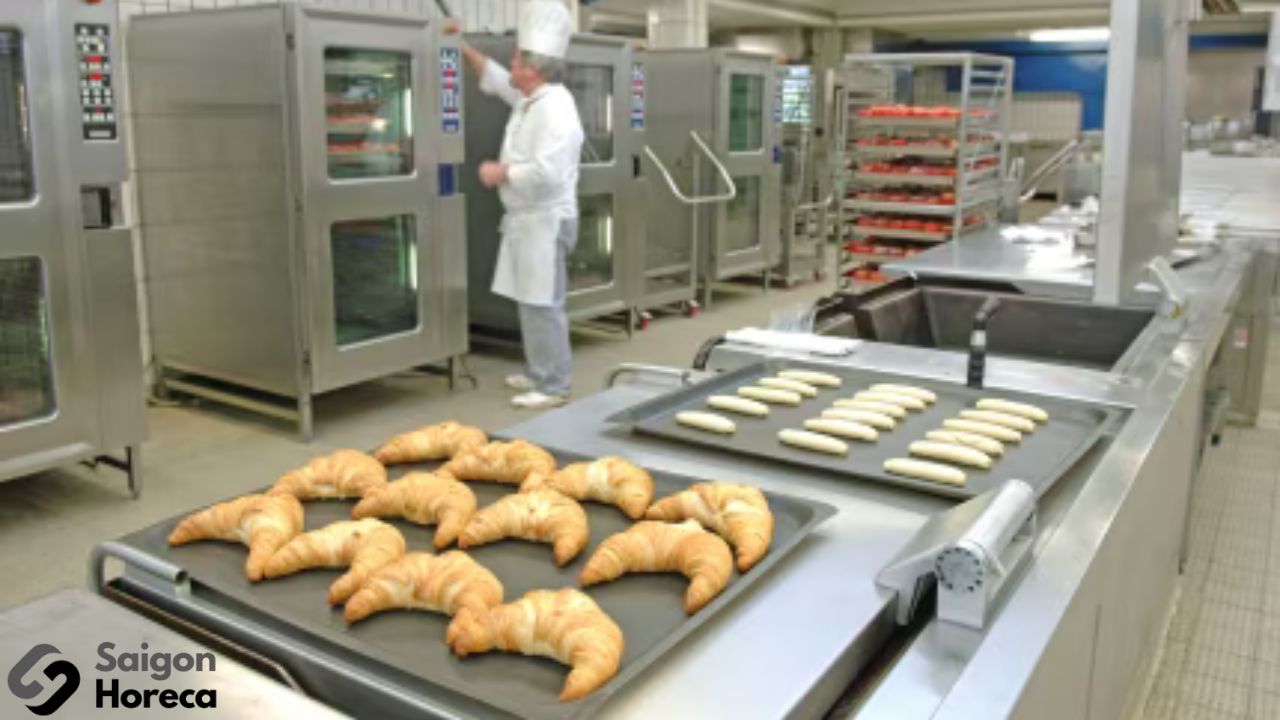

Marketing and Branding Strategy: Making Your Bakery Stand Out
Before opening your bakery, you need to run marketing campaigns and advertising to attract attention. You can break down the marketing strategy into five basic steps:
- Market Research:
The first step in any marketing campaign is market research to identify your target audience. The market research board typically describes population information in the area and neighboring areas, any existing competitors, and the relevant market. Once you’ve identified your target customers, you can start building an appropriate strategy.
- Outline Marketing Plan:
The summarized plan combines
the market research board with a business plan board. It usually includes average income information, potential customers’ spending habits, and competitor pricing.
- Define Goals for the Marketing Campaign:
Create specific goals for the campaign, such as how many followers on social media and sales targets for a month.
- Identify Suitable Advertising Methods:
Different advertising methods have their advantages. In the city, you might consider billboard advertising, which is cost-effective and provides high visibility. Traditional methods like newspaper and flyer advertising might also be considered.
- Create Media Influence:
Promoting through media is an excellent way to reach new customers. Focus on online platforms like websites, Facebook, Instagram, etc., as customers often check these before deciding to visit a business. Emphasize these media platforms to connect with potential customers.
Many methods used in retail don’t necessarily apply to wholesale bakeries. Wholesale bakeries often focus on evaluating competitors and finding potential customers, such as restaurants and convenience stores. Then, approach customers and find ways to close sales.
Grand Opening: Welcoming Success
The final step is to organize a grand opening event and welcome the first customers to your bakery. A successful grand opening sets the stage for business and builds connections with loyal customers. Promote the opening to ensure a good turnout and use promotions to attract customers.
Consider offering discounts and promotions to attract customers for the grand opening, such as discounts for the first 100 customers or a free cupcake for customers buying a dozen or more pastries. You can also provide free samples to convince customers to make a purchase.
Monday - Friday
from 8h00 to 18h00
Số 40 Đường số 6, KDC Melosa Khang Điền, Phú Hữu, HCM.
Contact anytime
In designing the bar space for homes, restaurants, or cafes,...
Read More
